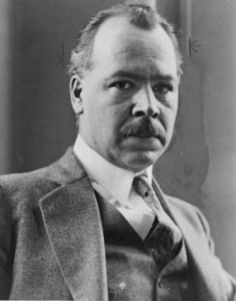Some Biogeographers, Evolutionists and Ecologists:
Chrono-Biographical Sketches
Vavilov, Nikolai Ivanovich (Russia 1887-1943)
phytogeography, crop science, plant genetics
 from Wikipedia.org |
Vavilov's is one the saddest stories in twentieth century science. By all accounts a man of truly extraordinary energy, intellectual powers, and charismatic personality, were it not for the backward Lamarckian theories of T. D. Lysenko and their support by the Soviet authorities he might have lived a full life and been destined to become the greatest crop geneticist and plant geographer of the twentieth century. Even as it was, his contributions were still very extensive. Initially with the support of the state, his studies added fundamentally to our knowledge of the characteristics of plant immunity, the nature of variability within plant species (leading to his "law of homologous series"), and the geographical centers of origin and biodiversity of cultivated forms. In 1955, after the death of Stalin, Vavilov's name was cleared of wrong-doing and he has since been recognized for what he undoubtedly was, "a symbol of the best aspects of Soviet science, and a martyr for scientific truth" (DSB, Vol. 15, p. 511). |
Life Chronology
--born in Moscow, Russia, on 25 November 1887.
--1911: graduates from the Moscow Agricultural Institute
--1911-1917: engaged in various teaching, student, and research activities
in Russia, England, and Central Asia
--1917: made professor at the Voronezh Agricultural Institute, and at
Saratov University
--1920: becomes director of the applied botany department at Petrograd
--1920: publishes his Law of Homologous Series in Variation [in
Russian]
--1920-1940: organizes at least 180 botanical collection expeditions,
including some forty extralimital to the Soviet Union
--1923: named director of the State Institute of Experimental Agronomy
at Leningrad
--1923: made a corresponding member of the Soviet Academy of Sciences
--1924: re-organizes the applied botany department into the All-Union
Institute of Applied Botany; this later becomes the All-Union Institute
of Plant Breeding (VIR)
--1925: receives the Przhevalsky gold medal of the U. S. S. R. Geographical
Society
--1926: receives the Lenin Prize
--1926: publishes his Centers of Origin of Cultivated Plants
[in Russian]
--1929: undertakes further institutional consolidation to form the All-Union
Lenin Academy of Agricultural Sciences; is made president (through 1935)
--1929: made a full member of the Soviet Academy of Sciences
--1931-1940: president of the U. S. S. R. Geographical Society
--1933-1940: director of the Soviet Academy's Institute of Genetics
--1939: elected president of the Seventh International Congress of Genetics,
but does not attend
--1940: arrested and imprisoned
--1941: convicted on spying and other charges and sentenced to ten years
in prison
--dies at Saratov, Russia, on 26 January 1943.
For Additional Information, See:
--The Vavilov Affair (1984).
--Dictionary of Scientific Biography, Vol. 15 (1978).
--Taxonomic Literature, Vol. 6 (1986).
--Economic Botany, Vol. 45(1) (1991): 38-46.
--Journal of Heredity, Vol. 38(8) (1947): 226-232.
--Impact of Science on Society, Vol. 39 (1989): 125-132.
--Soviet Genetics, Vol. 23(11) (1988): 1341-1346.
--Great Soviet Encyclopedia, Vol. 4 (1970): 540-541.
*
*
*
*
*
Copyright 2005 by Charles H. Smith. All rights
reserved.
http://people.wku.edu/charles.smith/chronob/VAVI1887.htm
Return to Home/Alphabetical Listing by Name
Return to Listing by Country
Return to Listing by Discipline